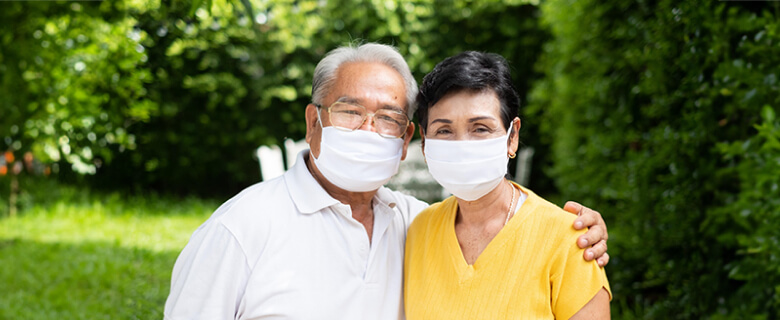symptoms
Symptoms of COVID-19
The most common symptoms of COVID-19 include8:
Fever
Cough
Fatigue
Loss of smell or taste
Less common symptoms:
Sore throat
Headache
Aches and pains
Diarrhoea
Rash on skin, or discolouration of fingers or toes
Red or irritated eyes
Serious symptoms:
Difficulty breathing or shortness of breath
Loss of speech or mobility, or confusion
Chest pain
The infection can be fatal in some cases, particularly in elderly patients or those with underlying health conditions.9
A person with COVID-19 is considered contagious for up to 10 days after symptom onset.10
After recovery, 31%–69% of patients will continue to exhibit COVID-19 related symptoms.11 The continuation or development of new symptoms 3 months after the initial infection is known as long COVID.11
management
What to do if infected?
After becoming infected with the COVID-19 virus, it may take anywhere from 2-14 days for symptoms to develop.12

Testing for COVID-19
If you have symptoms, testing is advised, especially before coming in to contact with high-risk individuals. If you do not have symptoms but have been exposed to someone with COVID-19, test yourself after 5 days.13
False negatives can happen, so repeat testing is recommended if symptoms persist or if you have recently come into contact with someone who tested positive.13
Preventing the spread
If you test positive for COVID-19, avoid close contact with others while still symptomatic.
If you must go out, please exercise social responsibility and practice the following:14
Wear a mask
Minimise your social interactions
Avoid crowded places
Do not visit vulnerable settings such as hospitals and nursing homes
Avoid contact with vulnerable persons, such as the elderly
If contact with vulnerable persons cannot be avoided, do take additional necessary precautions when interacting with them until you test negative.
Please consult a healthcare professional if you have persistent or severe COVID-19 symptoms.
long-covid
What is Long COVID?
Long COVID refers to symptoms and conditions that continue to develop after the initial COVID-19 infection and lasts for at least 3 months.15 It is hard to diagnose long COVID as there is no test to determine the symptoms are due to COVID-19.15
At least 10% of those who experienced severe COVID-19 infections develop long COVID, and more than 200 symptoms have been identified with impacts on multiple organ systems.16
The 7 hypotheses on long COVID’s cause:
Viral Persistence
Studies have shown that for some people, SARS-CoV-2 RNA may remain in the body well after the initial infection, resulting in the virus not being fully cleared and potentially causing chronic symptoms to persist.17
Immune Dysregulation
Patients in long COVID may have altered immune system, including T-cells and B-cells.18 These cells all play an important role in helping the immune system fight off current and future infections.19
Latent virus reactivation
Viruses that are dormant in patients may reactivate when the immune system is weakened. Challenges to the immune system with long COVID may cause some of these viruses to flare up.17
Autoimmunity
SARS-CoV-2 virus infection may cause our immune system to produce antibodies against our own body, leading to long COVID symptoms such as organ damage or inflammation.20
Microclots
Patients with acute COVID-19 and/or long COVID may develop tiny blood clots known as microclots.21 These clots may lead to blockages in the blood vessels and alter the flow of oxygen and blood to the body.21
Dysfunctional Neurological Signaling
Long COVID may have an impact on the nerve fibres in the patients’ brain.22 This may result in cognitive impairment and affect memory, concentration, and information processing.22
Disruption of the Microbiome
Long COVID’s negative impact on the immune system can disrupt the balance of microorganisms that normally exist throughout the body.17 This disruption may result in inflammation that enables bacteria to enter the body.17


Protect yourself against COVID-19
Protect yourself against COVID-19



